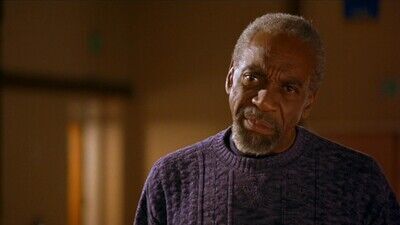Cobb’s presence could help sell narratives of historical trauma because he could so easily project internal conflict. That he’d been hiding something, swallowing years of injustice, now worn as a perpetual scowl. In movies like “Carolina Skeletons,” “Ghosts of Mississippi,” and the incredible “Nightjohn,” he’s a man who’s seen it all. “Nightjohn” is the best of the pack by a wide margin, directed by the great Charles Burnett and based on a book by Gary Paulsen. In it, he’s the elder field hand on a slave plantation, and there’s nothing he can’t predict when it comes to how everyone will be treated. His performance is all business, and the best character beat is when he, against his better judgment, plays drunk with paddy rollers so a younger man can get by them married in the dead of night.
Cobbs’ body of work, like any jobbing character actor, was full of peaks and valleys, but he made Nightjohn and appeared in Michael Apted’s “Always Outnumbered,” starring fellow N.E.C. alum Laurence Fishburne, written by Walter Mosley. Those are two of the best films made in my lifetime, and two of the best films about race somehow made in a system driven by the white impulse to conceal history.
A few months back, the writer David Moses observed that all Black cinema counts as what I would call The Unloved because the people judging and paying for it and ensuring it got its meager day in the sun were white. Thus, there was an element of condescension through access. The white producers and critical classes deigned to allow Black directors and writers their day in the sun because there was no alternative for years of mass producing and distributing Black cinema but through white channels. Cobbs was at once part of hijacking the accepted narratives and a reminder of what black actors were allowed to do in Hollywood. Jerrod Carmichael knew it when he cast him on an episode of “The Carmichael Show.”
Cobbs’ first role in a real blockbuster was as Whitney Houston’s trusted manager in “The Bodyguard,” a movie that would have no virtues if this cast weren’t involved. Cobbs stands tall above the overqualified cast, which also includes Kevin Costner, Mike Starr, and Richard Schiff. Casting directors are creatures of habit, and so Cobbs became the go-to for the face of strained tolerance in movies for white audiences with white casts. “Air Bud” is the most famous of these films, in which he swaggers like James Brown into the film to deliver his immortal line about a dog’s right to play basketball. It became a meme long before the term was coined, which is its own reward, but the list of mediocrities he elevated is nearly endless.
